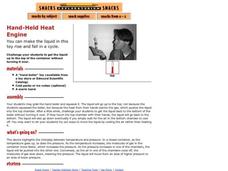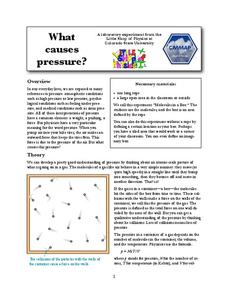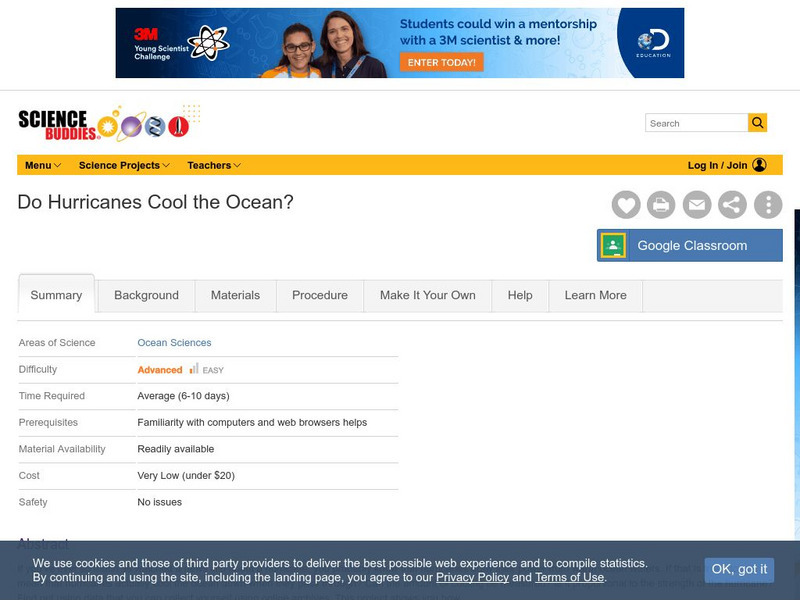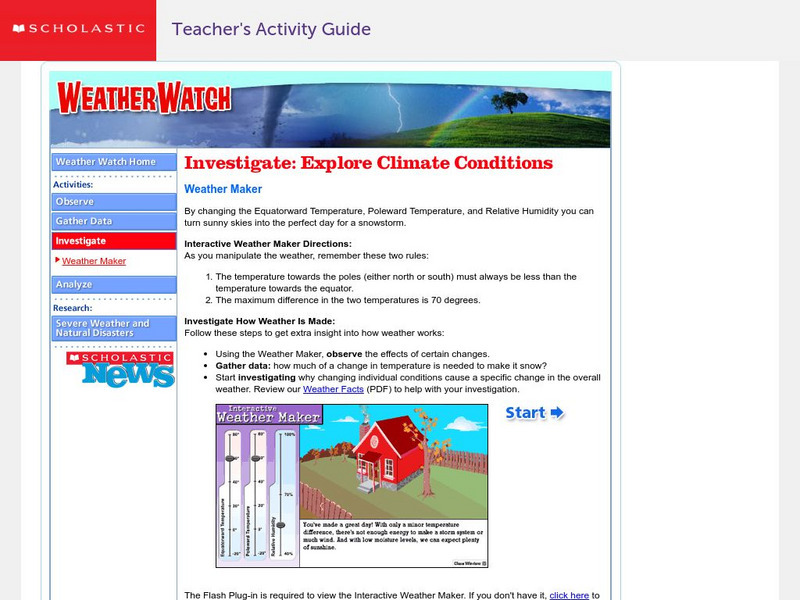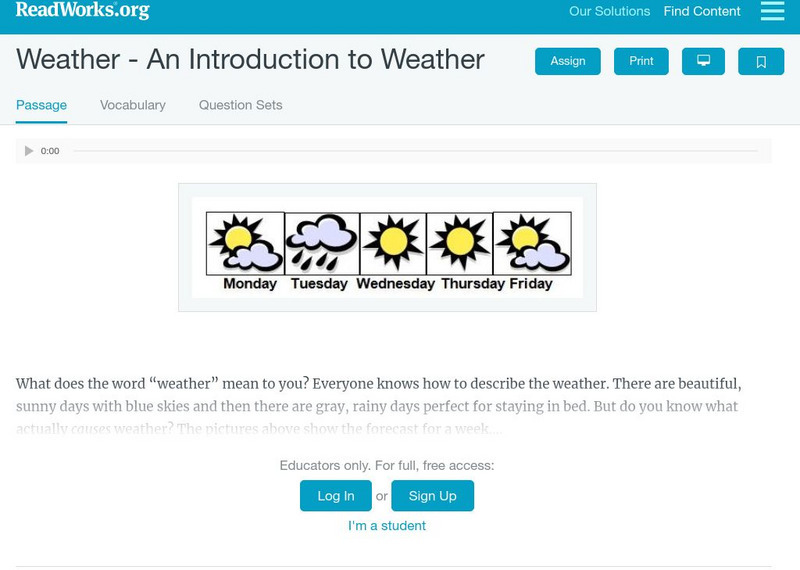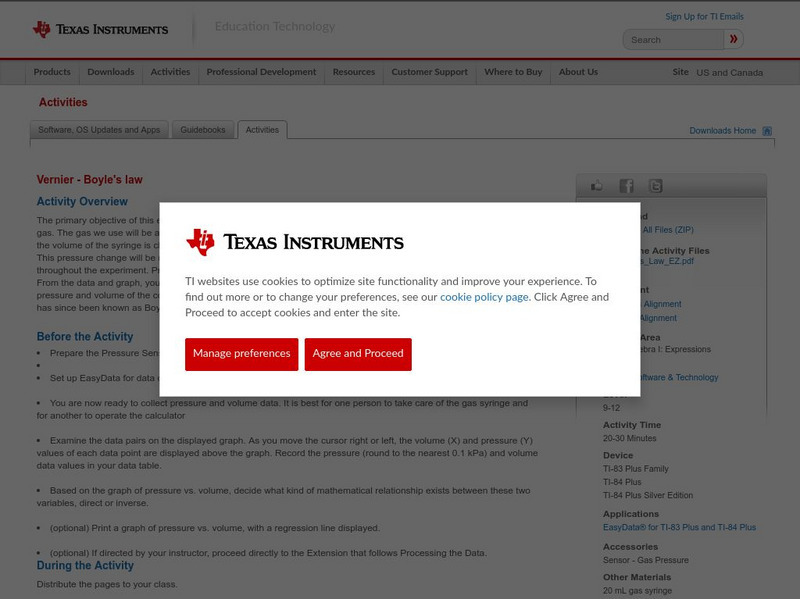NOAA
Climate, Weather…What’s the Difference?: Make an Electronic Temperature Sensor
What's the best way to record temperature over a long period of time? Scholars learn about collection of weather and temperature data by building thermistors in the fourth installment of the 10-part Discover Your Changing World series....
Colorado State University
Why Can Warm Air "Hold" More Moisture than Cold Air?—Vapor Pressure Exercise
Does it feel a little humid in here? Learners assume the role of water vapor in the atmosphere as they explore the differences between warm and cold air. They roll dice to determine their level of energy, which determines if they...
Exploratorium
Hand-Held Heat Engine
See the direct relationship between pressure and temperature using these classic science toys. As individuals hold the glass bulb, the liquid inside reaches it's boiling temperature, which is just a bit above room temperature. As the...
Colorado State University
What Causes Pressure?
Are you feeling the pressure? Let loose a little with a kinesthetic activity that models molecular motion in a closed space! The activity varies conditions such as volume and temperature and examines the effects on molecules.
Exploratorium
The Dipping Bird
If you have or want to order the dipping bird demonstration, it is useful for showing how evaporation and changes in the pressure of a closed system cause cyclical motion. After teaching about pressure, consider setting this little guy...
NASA
Write the Book on Weather Metrics
It's not easy to measure the weather. Pupils learn about what all weather has in common—the atmosphere. Scholars discover how a meteorologists must be able to measure aspects of the atmosphere and decipher the data. They then create a...
Teach Engineering
Equal and Opposite Thrust in Aircraft: You're a Pushover!
It's the law—every action requires a reaction, no matter how small. Pupils experience two demonstrations of Newton's third law of motion as it relates to thrust in the 10th segment of a 22-part unit on flight. Using their mathematical...
Scholastic
Scholastic: Dirtmeister's Science Lab: The Air Is There
An experiment to see how the temperature of an object affects how high it bounces. This site contains web links and notes for the teacher.
Texas Instruments
Texas Instruments: Temperature vs. Atmospheric Pressure: Is There a Correlation?
Relating Temperature to Atmospheric Pressure by using the CBL 2 unit and the temperature probe in relation to the gas pressure probe.
American Geosciences Institute
American Geosciences Institute: Wind Classroom Activities
When air is warmed, it expands and becomes less dense. As the air becomes less dense, its air pressure decreases. This occurs because molecules in warm air have greater kinetic energy (energy of motion) than in cold air. As the molecules...
University Corporation for Atmospheric Research
Ucar: Virtual Ballooning to Explore the Atmosphere Activity
In this computer-based virtual lab, students will learn about the layers of Earth's atmosphere by launching virtual balloons to collect temperature and pressure data at various altitudes. Given a limited number of balloon flights,...
American Geosciences Institute
American Geosciences Institute: Earth Science Week: Build Your Own Weather Station
Students are guided in how to build their own weather station that will measure temperature, humidity, precipitation, atmospheric pressure, and wind direction and speed.
PBS
Pbs Teachers: Collapsing Bottle Experiment
Explore the effect of changing temperature on air pressure using a plastic soda bottle.
PBS
Pbs Teachers: Bottle Fountain Experiment
Demonstrate how heating expands air molecules by constructing a bottle fountain powered by air pressure.
Science Buddies
Science Buddies: Do Hurricanes Cool the Ocean?
If you've ever so much as watched a news clip about a hurricane, you probably know that hurricanes draw their power from warm ocean waters. If that is true, does it mean that hurricanes actually cool the ocean down when they pass...
University Corporation for Atmospheric Research
Ucar: Create a Portable Cloud
In this hands-on activity, students experiment to discover how moisture, pressure, temperature, and condensation nuclei play a role in cloud formation.
Scholastic
Scholastic: Investigate: Explore Climate Condition
An interactive weather maker allows students to manipulate temperature and humidity and to view the type of weather that results.
Read Works
Read Works: Weather : An Introduction to Weather
[Free Registration/Login Required] Requires free membership.T his passage is a stand-alone curricular piece that reinforces essential reading skills and strategies and establishes scaffolding for vocabulary learning. It contains...
Texas Instruments
Texas Instruments: Vernier Boyle's Law
The primary objective of this experiment is to determine the relationship between the pressure and volume of a confined gas. The gas we use will be air, and it will be confined in a syringe connected to a Pressure Sensor (see Figure 1)....


